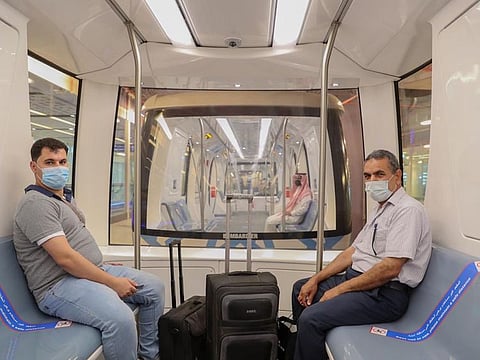Gulf's airlines struggle as regional services get hit with new restrictions
Several Gulf states have tightened up on flights and entry of non-nationals

Dubai: New restrictions on flights from within the region are not helping Gulf’s airlines to make a comeback from the turmoil they suffered in 2020.
Last month, Saudi Arabia banned entry of passengers from 20 countries, including the UAE, to combat the spread of the coronavirus.
And then, passengers were caught in a bind when Kuwait took a U-turn on its decision to allow non-Kuwaitis into the country. Two hours before the country’s airport was supposed to start welcoming non-Kuwaiti passengers after a two-week ban, the Directorate-General of Civil Aviation (DGCA) announced that non-Kuwaitis are barred until further notice.
All of these last-minute regulatory changes are not doing already battered airlines any favors. Air travel demand in the Middle East plunged 82.3 per cent in January compared to a year ago - and unchanged from the 82.6 per cent demand drop in December.
During the same period, airline seating capacity fell 67.6 per cent, while load factor declined to 40.8 per cent. “It’s safe to say situation won't be normal anytime soon - anywhere,” said Brendan Sobie, an aviation analyst. “This is will be a long and, at times, challenging recovery.”
Need for regional travel
As can be made out from China’s and US experiences, domestic travel will be instrumental in getting airline recovery chances back on track. In the second-half of 2020, demand for domestic flights in China soared, and this was repeated in the US over the final weeks of 2020. This was some compensation for airlines cut out from international routes.
In the Gulf, the closest to domestic flights would be those services between the states. There were signs of demand on these routes, more so after the re-establishment of flight services with Qatar.
“Regional travel in the Gulf is extremely important to many airlines - but particularly the LCCs (low-cost carriers),” said John Strickland, Director of JLS Consulting. “There are numerous reasons for travel. VFR (visiting friends and relatives) generates high volumes of passengers on a year-round basis between many countries and is most resilient to shocks.”
And although Middle East is doing “somewhat better” compared to Asia at moment, for any region there won't be a full recovery for at least a couple of years, according to Sobie.
Green signal
Abu Dhabi on Monday added Kazakhstan, Morocco and Saudi Arabia to its ‘Green’ list, which means passengers coming from those countries do not have to quarantine. The move will boost air travel along those routes, especially that from Saudi Arabia and ahead of the Ramadan month.
Alternative routes
Due to the border closure in Saudi Arabia, passengers from UAE are taking other routes to get to the country. Abu Dhabi-based Regal Tours is offering comprehensive travel and stay packages for those traveling to Saudi Arabia via Bahrain.
“Until now, we have sent more than 100 of passengers and they have safely reached Saudi Arabia,” a spokesperson for the travel agency said. “We provide transport until Dammam by road from Bahrain.”
An Emirates flight from Dubai to Bahrain will cost Dh860 next week. Gulf Air is charging Dh713 for the same route.
Return of business travel
Business travel, another important source of revenue for regional carriers, is non-existent now. Strickland believes that business travel will ultimately make a comeback thanks to a cultural emphasis on face-to-face contact when it comes to doing business. However, a lot of the demand might die off due to the popularity of conferencing via a Zoom or Teams.
Vaccination is the way
“A successful rollout of the vaccination programme in the GCC, coupled with adaptability and speed, is vital to the resurgence of the aviation industry,” said Linus Benjamin Bauer, Managing Director of Bauer Aviation Advisory. “Easing travel restrictions would lay the foundation for the GCC region to become one of the first economies to restart as opposed to other countries.”
Sign up for the Daily Briefing
Get the latest news and updates straight to your inbox








